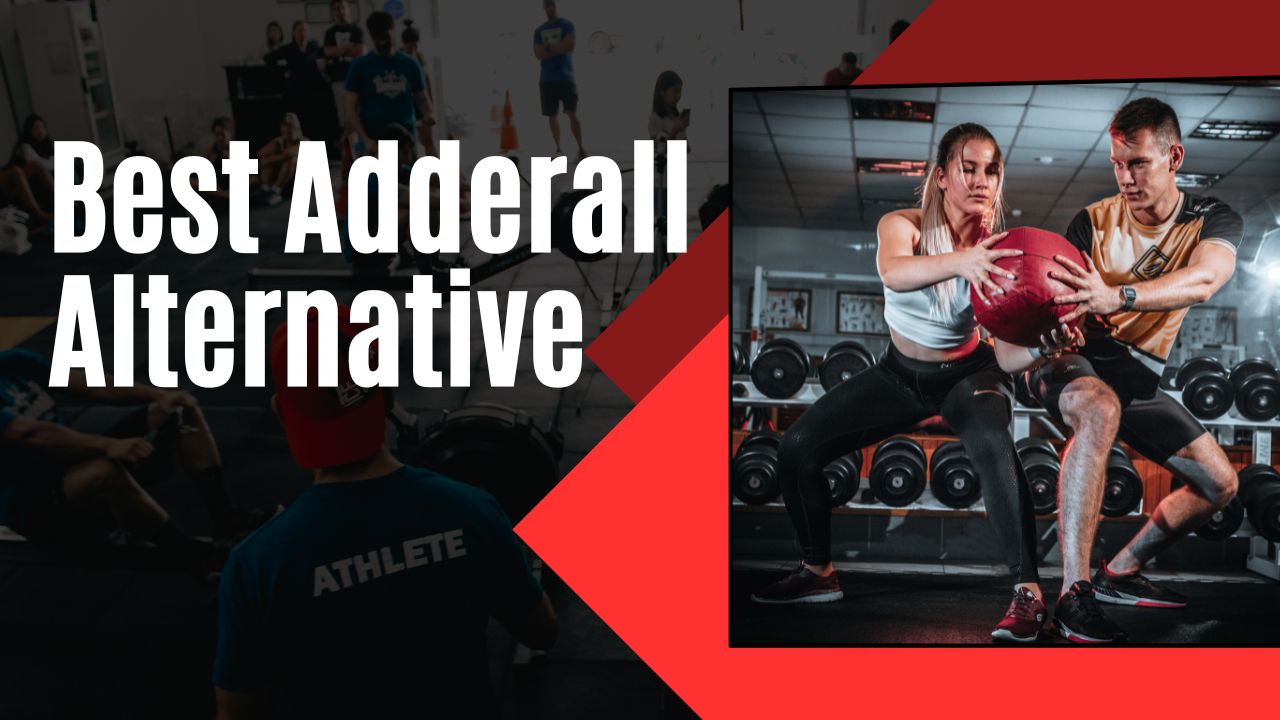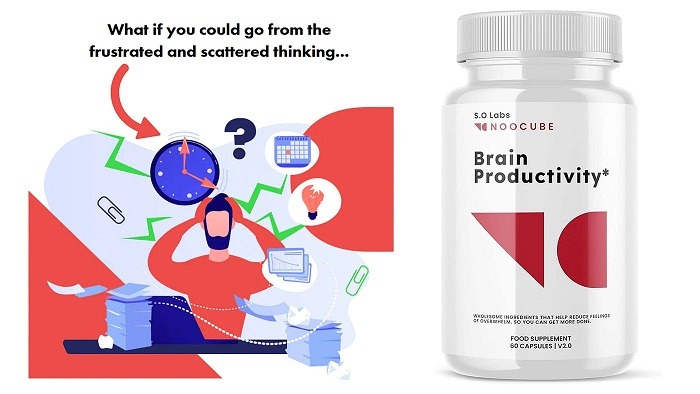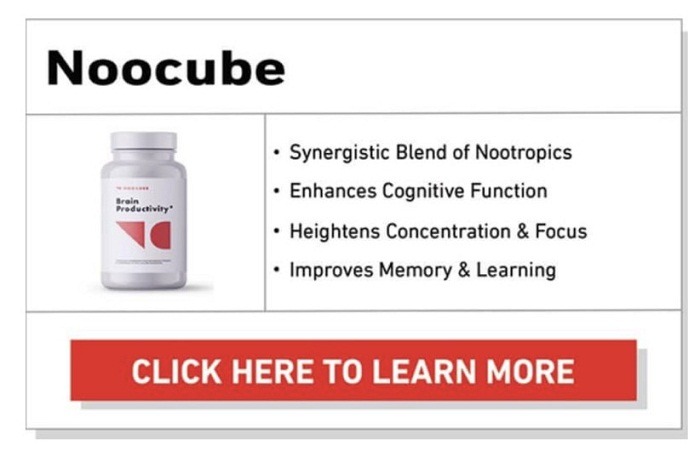Best Adderall Alternative
Contents
- 1 Best Adderall Alternative
- 2 Key Takeaway:
- 3 Adderall’s Mechanism
- 4 Natural Adderall Alternatives
- 5 Lifestyle Changes: Embracing a Holistic Approach
- 6 Natural Supplements: Potential Allies for Focus
- 7 OTC Adderall Alternatives
- 8 Prescription Alternatives
- 9 Choosing the Right Alternative
- 10 Safety Considerations and Potential Risks
- 11 Our Choice “NooCube” is The Best Adderall Alternative
- 12 Optimizing Focus Beyond Medication
- 13 Conclusion
- 14 Frequently Asked Questions
- 15 References
Adderall, a prescription medication containing amphetamine and dextroamphetamine, is widely used to treat attention deficit hyperactivity disorder (ADHD) and narcolepsy. Its effectiveness in boosting focus and alertness is undeniable. However, concerns regarding its potential for abuse and side effects have led many to explore safer and more natural alternatives. This comprehensive guide delves into the world of Adderall alternatives, encompassing natural supplements, lifestyle modifications, and even prescription options.
Key Takeaway:
This article explores alternatives to Adderall, a prescription medication used for ADHD and narcolepsy. It covers natural supplements, lifestyle changes, and even other prescription options.
Here are some key points:
- Adderall works by increasing focus and alertness but can have side effects.
- Consider natural approaches like getting enough sleep, eating a healthy diet, exercising regularly, and meditation.
- Some natural supplements like L-theanine, Rhodiola Rosea, Ginkgo Biloba, Bacopa Monnieri, and Omega-3 fatty acids may help focus.
- Over-the-counter options like caffeine and L-tyrosine may provide a boost.
- Prescription alternatives like Modafinil and Methylphenidate exist.
- Talk to your doctor to find the best option for you, considering factors like the severity of symptoms and desired effects.
Adderall’s Mechanism
Before exploring alternatives, it’s crucial to understand Adderall’s working principle. By stimulating the central nervous system, Adderall increases the levels of dopamine and norepinephrine, neurotransmitters crucial for focus, alertness, and motivation. While this stimulation enhances cognitive function, it can also lead to unwanted side effects like insomnia, anxiety, and even dependence with long-term use.
Natural Adderall Alternatives
The good news is there are numerous natural approaches to improve focus and attention without resorting to prescription medications. Here, we explore two key pillars: lifestyle changes and natural supplements.
Lifestyle Changes: Embracing a Holistic Approach
The human body is a complex ecosystem, and our daily habits significantly impact brain function. By prioritizing certain lifestyle changes, we can cultivate a naturally focused and alert mind.
Sleep: The Foundation of Focus Aim for 7-8 hours of quality sleep each night. Sleep is essential for cognitive function, memory consolidation, and overall brain health. A well-rested brain is a sharp brain. Develop a consistent sleep schedule by going to bed and waking up at the same time every day, even on weekends. Create a relaxing bedtime routine to signal to your body that it’s time to wind down. This may include activities like reading, taking a warm bath, or practicing relaxation techniques.
Diet: Fueling Your Focus Nourish your brain with a balanced diet rich in fruits, vegetables, whole grains, and lean proteins. These foods provide essential nutrients like vitamins, minerals, and antioxidants that support brain function. Avoid processed foods, excessive sugar, and unhealthy fats, as these can impair cognitive function and lead to energy crashes. Stay hydrated by drinking plenty of water throughout the day, as dehydration can negatively impact focus and concentration.
Exercise: Boosting Brainpower Regular physical activity, even for 30 minutes a day, can significantly enhance focus and memory. Exercise increases blood flow to the brain, delivering oxygen and nutrients that promote the growth of new brain cells and improve cognitive flexibility. Choose activities you enjoy, whether it’s jogging, dancing, or yoga, as consistency is key to reaping the cognitive benefits of exercise.
Meditation: Cultivating Calm Focus Meditation practices like mindfulness meditation can train your brain to maintain focus and reduce distractions. Even a few minutes of daily meditation can significantly improve concentration and attention span. Find a quiet space, sit or lie down comfortably, and focus on your breath or a mantra. When your mind wanders, gently bring it back to the present moment without judgment.
Organization and Planning: Structuring Your Day Develop organizational skills like time management and creating to-do lists to structure your day effectively. Prioritize tasks based on importance and deadlines, and break them down into smaller, manageable steps. Use tools like calendars, planners, or digital apps to stay organized and minimize distractions. Create a workspace that is conducive to focus, with minimal clutter and distractions.
Natural Supplements: Potential Allies for Focus
Several natural supplements have gained traction for their potential to enhance focus and concentration. However, it’s important to note that research on their effectiveness is ongoing. Here’s a closer look at some popular options:
- L-theanine: Found abundantly in green tea, L-theanine promotes relaxation and reduces anxiety by increasing levels of neurotransmitters like GABA and dopamine. Studies suggest it can counteract the jittery side effects of caffeine while enhancing focus and attention. It may also improve sleep quality and reduce symptoms of anxiety and depression.
- Rhodiola Rosea: This adaptogenic herb helps the body adapt to stress and has been used in traditional medicine for centuries. Research suggests that Rhodiola Rosea may reduce fatigue and improve mental performance, particularly in stressful conditions. It is believed to work by modulating the body’s stress response system, including the hypothalamus, pituitary, and adrenal glands.
- Ginkgo Biloba: Used for centuries in traditional Chinese medicine, Ginkgo Biloba is known for its cognitive-enhancing properties. It is believed to improve memory, focus, and blood flow to the brain by increasing circulation and protecting against oxidative stress. Studies suggest it may be particularly beneficial for age-related cognitive decline and conditions like Alzheimer’s disease.
- Bacopa Monnieri: Also known as Brahmi, this herb is traditionally used in Ayurvedic medicine to enhance memory and learning. Research on Bacopa Monnieri’s cognitive benefits is mixed, but some studies suggest it may improve cognitive function, particularly in older adults. It is believed to work by enhancing the communication between neurons and promoting nerve cell growth.
- Omega-3 Fatty Acids: Found in fatty fish like salmon, mackerel, and sardines, as well as fish oil supplements, omega-3 fatty acids are essential for brain health. Research has shown that omega-3 fatty acids may improve cognitive function, memory, and focus by reducing inflammation, promoting the growth of new neurons, and enhancing communication between brain cells. Omega-3 fatty acids are also important for overall health, including heart health and reducing inflammation throughout the body.
OTC Adderall Alternatives
Several over-the-counter (OTC) options offer a potential boost in focus and alertness. However, it’s crucial to be mindful of potential side effects and consult a healthcare professional before starting any new supplement.
- Caffeine: The most widely used stimulant, caffeine found in coffee, tea, and energy drinks can improve focus and alertness. However, excessive consumption can lead to jitteriness, anxiety, and disrupted sleep patterns.
- L-Tyrosine: This amino acid plays a role in the production of dopamine and norepinephrine, neurotransmitters crucial for focus and motivation. Supplementation with L-Tyrosine may improve cognitive function and mental performance under stress.
- Phenylethylamine (PEA): A naturally occurring neurotransmitter, PEA plays a role in mood regulation and focus. Early research suggests PEA supplements may enhance mood and focus, but more research is needed.
Prescription Alternatives
For individuals who require a more potent intervention. However, it’s vital to discuss these options with a healthcare professional to ensure they align with your specific needs and medical history. Here are two potential prescription alternatives:
- Modafinil: Primarily used to treat narcolepsy, a sleep disorder characterized by excessive daytime sleepiness, Modafinil has shown promise in improving focus and alertness. However, it can cause side effects like headaches, nausea, and anxiety. Off-label use of Modafinil requires careful consideration with a doctor.
- Methylphenidate: Another stimulant medication commonly used to treat ADHD, Methylphenidate operates similarly to Adderall but may have a slightly different side effect profile. It can be a good option for individuals who experience significant side effects with Adderall.
Choosing the Right Alternative
The best alternative to Adderall depends on several factors, including:
- Severity of ADHD or narcolepsy symptoms
- Underlying medical conditions
- Desired level of focus enhancement
- Risk tolerance for side effects
- Lifestyle and preferences
It’s highly recommended to consult a healthcare professional to determine the most suitable alternative for your unique situation. They can assess your individual needs, review your medical history, and discuss any potential interactions with current medications.
Safety Considerations and Potential Risks
It’s important to approach all alternatives, including both natural and prescription options, with caution. Here are some key safety considerations:
- Supplement Regulation: Natural supplements are not as rigorously regulated as prescription medications. Research quality may vary, and potential interactions with other medications or underlying health conditions exist.
- Dosage and Side Effects: Understanding the recommended dosage and potential side effects of any supplement or medication is crucial.
- Underlying Health Conditions: Individuals with certain pre-existing health conditions, such as heart disease or anxiety, may need to avoid specific alternatives due to potential complications.
Our Choice “NooCube” is The Best Adderall Alternative
When looking for a safe and effective alternative to Adderall, NooCube stands out as a top choice. NooCube is a nootropic supplement that offers a range of cognitive benefits without the side effects associated with Adderall. Here’s why NooCube is considered the best Adderall alternative:
- Natural Ingredients: NooCube is made from a blend of natural ingredients that are known for their cognitive-enhancing properties. These ingredients include Alpha GPC, Huperzine A, Cat’s Claw, Bacopa Monnieri, Oat Straw, and L-Theanine, among others.
- Enhanced Focus and Concentration: NooCube helps improve focus, concentration, and mental clarity, making it an ideal choice for individuals looking to boost productivity and cognitive performance.
- Improved Memory: The ingredients in NooCube have been shown to enhance memory and learning, making it beneficial for students and professionals alike.
- Safe and Non-Addictive: Unlike Adderall, which is a prescription stimulant, NooCube is non-addictive and does not carry the risk of dependency or withdrawal symptoms.
- No Side Effects: NooCube is well-tolerated and does not cause jitteriness, insomnia, or other side effects commonly associated with Adderall.
- Convenient and Easy to Use: NooCube comes in capsule form, making it convenient to take and incorporate into your daily routine.
- Positive User Reviews: NooCube has received numerous positive reviews from users who have experienced improvements in focus, memory, and overall cognitive function.
NooCube is a safe, effective, and natural alternative to Adderall for those seeking to enhance their cognitive function without the risks associated with prescription stimulants.
Optimizing Focus Beyond Medication
Focusing solely on medication or supplements is not a holistic approach to improving focus. Here are some additional strategies to consider:
- Cognitive Behavioral Therapy (CBT): CBT can teach effective strategies for managing ADHD symptoms and improving focus.
- Brain-Training Games: While research on their long-term benefits is ongoing, some brain-training games may offer cognitive benefits and improve focus.
- Stress Management Techniques: Chronic stress can significantly impair concentration. Practicing stress-management techniques like yoga or deep breathing can be helpful.
Conclusion
While Adderall offers a powerful solution for treating ADHD and narcolepsy, exploring alternatives allows for a more personalized and potentially safer approach. By considering natural supplements, lifestyle changes, and even alternative medications, you can find a strategy to enhance focus and unlock your full potential. Remember, the ideal path requires open communication with a healthcare professional who can guide you toward a solution that aligns with your individual needs and health goals.
Frequently Asked Questions
What is the best replacement for Adderall?
- The best replacement for Adderall depends on individual needs and preferences. Some alternatives to Adderall include Ritalin, Vyvanse, Concerta, and non-stimulant medications like Strattera.
What’s better Adderall or Ritalin?
- Adderall and Ritalin are both effective medications for ADHD, but their effectiveness can vary from person to person. Some people may respond better to Adderall, while others may prefer Ritalin. It’s best to consult with a healthcare professional to determine which medication is right for you.
What is the best nootropic for ADHD?
- The best nootropic for ADHD can vary depending on individual needs. Some popular nootropics for ADHD include L-theanine, bacopa monnieri, and ginkgo biloba. It’s important to consult with a healthcare professional before starting any new supplement regimen.
Is L Tyrosine a substitute for Adderall?
- L-tyrosine is not a substitute for Adderall. L-tyrosine is an amino acid that is involved in the production of dopamine, which can help support cognitive function. However, it is not a stimulant medication like Adderall.
Who should not use L-tyrosine?
- L-tyrosine is generally considered safe for most people when taken in recommended doses. However, it may not be suitable for people with certain medical conditions, such as thyroid disorders or melanoma. It’s best to consult with a healthcare professional before taking L-tyrosine.
Is taking L-tyrosine safe?
- L-tyrosine is generally considered safe for most people when taken in recommended doses. However, it may cause side effects such as nausea, headache, or heartburn in some people. It’s always best to consult with a healthcare professional before starting any new supplement regimen.
What is the most successful ADHD medication?
- The most successful ADHD medication can vary from person to person. Some of the most commonly prescribed medications for ADHD include stimulants like Adderall, Ritalin, and Vyvanse, as well as non-stimulant medications like Strattera.
What are the top 3 ADHD medications?
- The top 3 ADHD medications are often considered to be Adderall, Ritalin, and Vyvanse. However, the best medication for ADHD can vary depending on individual needs and responses.
What is the number 1 ADHD medication?
- There is no single “number 1” ADHD medication, as the best medication for ADHD can vary depending on individual needs and responses. Some people may respond better to stimulant medications like Adderall or Ritalin, while others may prefer non-stimulant medications like Strattera.
What is the strongest nootropic?
- The strongest nootropic can vary depending on individual responses and needs. Some powerful nootropics include modafinil, phenylpiracetam, and noopept. It’s important to use these substances responsibly and under the guidance of a healthcare professional.
What is the best stimulant for the brain?
- The best stimulant for the brain can vary depending on individual needs and responses. Some common stimulants for the brain include caffeine, Adderall, and Ritalin. It’s important to use these substances responsibly and under the guidance of a healthcare professional.
What pill calms ADHD?
- Stimulant medications like Adderall and Ritalin are commonly used to help calm ADHD symptoms. Non-stimulant medications like Strattera can also be effective in managing ADHD symptoms.
How can I calm my ADHD brain?
- Several strategies can help calm an ADHD brain, including practicing mindfulness and meditation, getting regular exercise, maintaining a balanced diet, and seeking support from a therapist or support group.
Is there something better than Adderall for ADHD?
- There are several medications and treatments available for ADHD besides Adderall, including Ritalin, Vyvanse, Concerta, and non-stimulant medications like Strattera. It’s best to consult with a healthcare professional to determine which treatment is right for you.
What gives ADHD people energy?
- People with ADHD may experience fluctuations in energy levels due to the way their brains process dopamine and norepinephrine. Stimulant medications like Adderall and Ritalin can help increase dopamine and norepinephrine levels, which can improve energy levels in people with ADHD.
Why does Red Bull make people with ADHD sleepy?
- Red Bull and other energy drinks contain high levels of caffeine, which is a stimulant that can increase alertness and energy levels. However, in some people with ADHD, caffeine can have a calming effect and may make them feel sleepy.
What is the Starbucks syndrome for ADHD?
- The “Starbucks syndrome” refers to the idea that caffeine, such as that found in Starbucks coffee, can have a calming effect on people with ADHD, helping to improve focus and attention.
What can I drink for energy with ADHD?
- People with ADHD can drink beverages that contain caffeine, such as coffee, tea, or energy drinks, to help boost their energy levels. It’s important to consume caffeine in moderation and to avoid excessive consumption, which can lead to negative side effects.
How do you increase dopamine in ADHD?
- There are several ways to increase dopamine levels in people with ADHD, including taking medications like stimulants (e.g., Adderall, Ritalin), engaging in regular exercise, getting enough sleep, and eating a balanced diet rich in protein.
Why does Redbull help me focus?
- Red Bull and other energy drinks contain caffeine, which is a stimulant that can increase alertness and improve focus. However, the effects of caffeine can vary from person to person.
Does Redbull help ADHD?
- Red Bull and other energy drinks can provide a temporary boost in energy and focus for people with ADHD due to their caffeine content. However, it’s important to consume these beverages in moderation and to be aware of their potential side effects.
Does Red Bull increase dopamine?
- Caffeine, the main ingredient in Red Bull, can increase dopamine levels in the brain, which can improve mood and focus. However, the effects of caffeine can vary from person to person.
Why does ADHD make me so tired?
- ADHD can cause fatigue and tiredness due to the way it affects the brain’s dopamine and norepinephrine levels. People with ADHD may also have difficulty regulating their sleep patterns, which can contribute to feelings of tiredness.
What energy drink is best for focus?
- The best energy drink for focus can vary depending on individual preferences and tolerance to caffeine. Some popular energy drinks known for their focus-enhancing properties include Red Bull, Monster, and Rockstar.
References
- Mayo Clinic: Adderall (ADHD medication): Uses, side effects, and dosages: https://www.mayoclinic.org/drugs-supplements/amphetamine-oral-route/precautions/drg-20150941
- WebMD: Adderall for ADHD: Benefits and Side Effects: https://www.webmd.com/drugs/2/drug-63163/adderall-oral/details
- National Institute on Mental Health: ADHD Medications: https://www.ncbi.nlm.nih.gov/pmc/articles/PMC3666055/ (This page provides information on medications used to treat ADHD, including Adderall.)
- Drugs.com: Adderall: https://www.drugs.com/adderall.html
- The New York Times: Adderall Use Rises Sharply Among Adults: New York Times article discussing the rising use of Adderall in adults: https://www.nytimes.com/2022/10/13/health/adderall-shortage-adhd.html
Disclaimer: As mentioned in the article, Adderall is a prescription medication and should only be taken under the supervision of a doctor. If you’re considering using Adderall Alternatives please consult a healthcare professional to discuss the risks and benefits specific to your situation.



